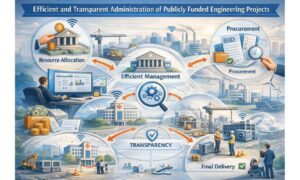As the world pivots towards a greener future, the sustainability sector is blossoming, creating a myriad of job opportunities for passionate individuals ready to make an impact. Whether you’re a seasoned professional looking to pivot your career or a fresh graduate eager to dive into this thriving field, navigating the complex landscape of sustainability jobs can be both exciting and overwhelming. In this blog post, we’ll equip you with essential tips and strategies to help you carve out your niche in one of today’s most dynamic industries. From honing your skills and building connections to discovering untapped job markets, join us as we unpack the roadmap to finding your perfect place in the sustainability sector – where passion meets purpose!
The growing field of sustainability and environmental jobs
As the world grapples with climate change and environmental degradation, an exciting opportunity is emerging in the job market. The sustainability sector is rapidly expanding, inviting passionate individuals to join a movement that prioritizes ecological health and social equity. From renewable energy advocates to wildlife conservationists, roles in sustainability and environmental jobs are diverse and impactful. If you’re drawn to making a difference while carving out a meaningful career path, now is the perfect time to explore your options in this vibrant field. Whether you’re just starting or looking for a shift, navigating this landscape can be both challenging and rewarding. Let’s dive into how you can find your place in the sustainability sector!
Understanding the sustainability sector: What does it mean to work in sustainability?
The sustainability sector is broad and dynamic, focusing on practices that protect the environment while promoting economic growth. Working in this field means engaging with various industries, from renewable energy to waste management.
Professionals in sustainability often aim to create innovative solutions for pressing environmental issues. This could involve developing green technologies or advocating for sustainable policies.
Collaboration plays a key role here. Individuals may work alongside scientists, policymakers, and community leaders to drive meaningful change.
Roles vary widely—from project managers who oversee initiatives to researchers analyzing data for better decision-making. Each position contributes uniquely toward building a more sustainable future.
Ultimately, working in sustainability demands a blend of passion and technical expertise. It’s about being part of something larger than oneself—helping shape a healthier planet for generations to come.
Identifying your skills and interests: How to determine which sustainability job is right for you
Finding the right sustainability job starts with a deep dive into your skills and passions. Reflect on what you enjoy most—do you thrive in research, or is problem-solving more your style?
Consider your strengths. Are you a great communicator? Perhaps advocacy or education roles could be ideal for you. If you’re analytical, data-driven positions might ignite your interest.
Explore various sustainability sectors such as renewable energy, conservation, or sustainable agriculture. Each area requires different skill sets and offers unique opportunities.
Engaging in self-assessment tools can help clarify where your interests align with industry needs. Online quizzes and personality tests specific to career planning may provide insights into suitable paths.
Lastly, don’t forget about hands-on experience! Volunteer work or internships can shed light on what excites you in the field of sustainability while building valuable skills along the way.
Researching companies and organizations: Where to look for sustainable job opportunities
When searching for sustainability and environmental jobs, knowing where to look is crucial. Start by exploring online job boards dedicated to eco-friendly careers. Websites like EcoJobs.com or SustainableBusiness.com can give you a head start.
Don’t overlook company websites. Many organizations post openings directly on their career pages before listing them elsewhere. Target companies known for their sustainable practices—those with strong corporate social responsibility (CSR) initiatives.
Networking platforms also offer valuable insights. LinkedIn groups focused on sustainability are excellent resources for connecting with industry professionals and discovering unadvertised positions.
Engage in conversations within your community as well. Local NGOs often seek passionate individuals who want to make a difference, providing hands-on opportunities that may lead to fulfilling careers in the sector.
Remember, every interaction counts; showing genuine interest can open doors you never expected.
Networking and building connections: The power of networking in the sustainability sector
Building a network in the sustainability sector can open doors to opportunities you never knew existed. Connecting with like-minded individuals amplifies your chances of finding job openings that align with your values.
Attending industry events, workshops, or conferences creates a space for meaningful interactions. These gatherings are filled with professionals who share your passion for environmental change. Engaging in conversations can lead to valuable relationships and insights into potential job roles.
Social media platforms, particularly LinkedIn, serve as powerful tools for networking. Join groups focused on sustainability discussions and participate actively. Sharing articles or thoughts can establish you as a knowledgeable voice within the community.
Don’t underestimate informal connections either. Conversations at local meetups or volunteer activities often lead to unexpected career advice or collaboration ideas. Building these ties fosters support and knowledge-sharing that benefits everyone involved in the journey towards sustainability.
Crafting a sustainable resume and cover letter: Tips on highlighting your qualifications and passion for sustainability
Your resume and cover letter are your first impression in the sustainability sector. Make sure they reflect not just your skills but also your passion for environmental issues.
Start with a clear layout. Use headings to organize information effectively. Highlight relevant experience, whether it’s a job, volunteer work, or even personal projects that showcase your commitment to sustainability.
Incorporate keywords from the job description into both documents. This will demonstrate you understand industry language and priorities.
Don’t shy away from sharing specific achievements related to sustainability initiatives you’ve been part of—numbers speak volumes!
For the cover letter, tell a story that connects your background to why you want to contribute to sustainable practices. Personal anecdotes can create an engaging narrative about your journey toward this field.
Lastly, infuse genuine enthusiasm throughout both documents; let them feel the excitement you have for making a difference in our world through sustainable efforts.
Preparing for interviews: Common questions and how to answer them effectively
Preparing for interviews in the sustainability sector requires a unique approach. Employers often seek candidates who are not only skilled but also genuinely passionate about environmental issues.
Expect questions that assess your knowledge of sustainable practices. Be ready to discuss specific projects you’ve worked on or initiatives you admire. This demonstrates both your expertise and commitment.
Behavioral questions may arise too, like, “Can you describe a time when you faced an ethical dilemma?” Use the STAR method—Situation, Task, Action, Result—to structure your responses clearly and effectively.
Additionally, be prepared to share how you’ve collaborated with others in previous roles. Teamwork is crucial in sustainability efforts. Highlight instances where collective action led to significant outcomes.
Finally, don’t shy away from asking insightful questions yourself. Inquire about the company’s sustainability goals or challenges they face; this shows genuine interest and engagement with their mission.
Continuing education and certifications: How specific skills can boost your career in sustainability
Continuing education plays a pivotal role in the sustainability sector. With rapid advancements and complex challenges, staying updated is essential.
Specialized certifications can set you apart from other candidates. They showcase your commitment to environmental issues and demonstrate expertise in specific areas like renewable energy or sustainable agriculture.
Online courses offer flexibility. You can learn at your own pace while juggling work and personal commitments. Look for programs that align with your career goals; this focused approach enhances your skill set effectively.
Networking opportunities often accompany these educational experiences. Engaging with peers and industry professionals can lead to valuable connections that may open doors down the line.
Lastly, don’t underestimate the power of workshops and seminars. These not only provide up-to-date knowledge but also foster a community of passionate individuals working toward similar goals in sustainability.
Navigating challenges: Overcoming obstacles and staying motivated in the competitive job market
The journey to securing a position in sustainability and environmental jobs can be challenging. The competition is fierce, with many qualified candidates vying for the same roles.
When faced with setbacks, it’s essential to stay focused on your goals. Set small, achievable milestones that keep you motivated along the way. Celebrate these victories, no matter how minor they may seem.
Engage with online communities centered around sustainability. These groups often share job leads and offer support during tough times. Connecting with like-minded individuals fosters resilience and inspiration.
Additionally, consider diversifying your approach by exploring internships or volunteer opportunities. Gaining experience in various aspects of the field not only enhances your resume but also expands your network.
Remember to practice self-care as well. Maintaining a healthy work-life balance will ensure you remain energized and passionate about pursuing your dream career in sustainability.
Conclusion
The sustainability sector is rapidly growing and offers a wide range of opportunities for job seekers. By following the tips outlined in this article, you can set yourself up for success in navigating the job market and finding your place in this important field. Embrace your passion for sustainability, make connections, and continuously learn to stand out as a candidate in this competitive industry. With dedication and determination, you can build a meaningful career that positively impacts both people and planet. Best of luck on your journey towards making a difference!



































